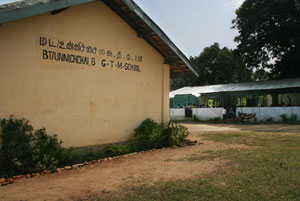Although a large number of the war displaced have returned to Batticaloa district , thousands of children are not getting back to school and face setbacks to their education even when they do.
Many resettled children are unable to return because local schools remain badly damaged from the fighting and still lack equipment, supplies, clean water, and sanitation facilities.
Others have no option but to work to supplement their family’s income because of a lack of jobs in and around resettlement villages. “At around 12 to 14 years of age the students often begin working with their fathers in the paddy fields at harvest time or fishing to make money,” Dhayawadhi Princely, English teacher at Unnichchi 8th Mile Post GTMS in Batticaloa said.
The school at 8th Mile Post was closed throughout 2007, during which time Ms. Princely taught whoever could attend the classes she held outdoors in Batticaloa town . “We couldn’t teach our own children because they fled in different directions,” said Ms Princely. “But what could we do? We had to work.”
The 8th Mile Post school reopened in April 2008, but getting students to come back has been difficult.
“The World Food Programme provides food and we get more children because of that,” said Princely. “For at least half of the children, it’s the reason they come. It’s very useful for us.”
The school still lacks electricity and has been seriously damaged by wild elephants on two occasions in the past six months.
As of December 2008, over 115,000 people have been resettled in Batticaloa according to UNHCR. Only about 80 odd families have to be resettled. This successful, government-led initiative was recently described by the agency as a significant piece of “overlooked good news” that has been shadowed by the reports of over 230,000 newly displaced people due to fighting in the Wanni.
Nevertheless, the resettlement process remains rife with challenges such as providing electricity, telecommunications, clean water, food, and livelihoods to so many families. In circumstances where basic survival is still an issue, education becomes less of a priority.
“A concerted effort is needed to make sure that children do go back to school,” said Ita Sheehy, Chief of Education, UNICEF Sri Lanka. “This is very difficult in many cases, as resettled families have few resources and older children in particular are often needed to work to support the family and supplement the family income.”
Thirty six schools re-opened in Batticaloa in 2008 and two more since the start of the new year but many are understaffed, according to A.M.E Paul, Zonal Director of Education for Batticaloa.
Only 15 English teachers have been posted to the district, and many teachers have difficulty accessing public transportation to get to work.
“People are being resettled but they are not sending the children to school,” said A.M.E. Paul, Zonal Director of Education for Batticaloa. “A few schools are functioning normally.”
Even for those children who have returned to school, there are numerous hurdles to overcome. Many have fallen behind as a result of living in IDP camps for months, and others have had traumatic experiences but lack the support systems needed to deal with them.
Currently, UNICEF Sri Lanka is providing training to teachers in basic psychosocial skills that will help enable them to help children cope with their experiences and enable them to restart their education.
The agency has launched a back-to-school mobilization effort and has built several temporary learning shelters throughout Batticaloa for children living in areas where school buildings were destroyed or damaged.
Some of the children who have missed long periods of schooling are being enrolled in accelerated learning programmes overseen by the Zonal Director of Education and funded by UNICEF. The programmes are designed to give students the basic skills needed to rejoin their respective grade levels.
“This approach is very successful in providing a transition for children to rejoin formal school and prevents them from dropping out,” said Sheehy. Even with these coordinated efforts, however, the most important thing for children returning to Batticaloa after long periods of displacement is a sense of stability and peace, according to Ms. Princely. “If there is peace, they can learn well,” she said. |

